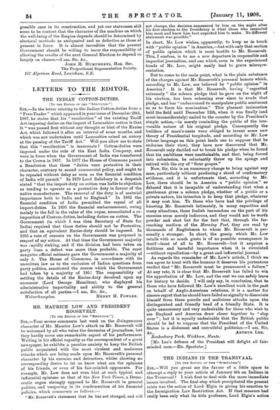LETTERS TO THE EDITOR.
THE INDIAN COTTON-DUTIES.
pro THE EDITOR OF THE "SPECTATOR."'
Slit,—In the letter relating to the Indian Cotton-duties from a " Free-Trader " which appeared in your issue of December 28th, 1907, he states that his "recollection" of the existing Tariff Act imposing duties on the import of Lancashire cotton is that it "was passed first without any thought or hint of the Excise Act, which followed it after an interval of some months, and which was not undertaken until Lancashire raised an outcry at the passing of the Tariff Act." Will you allow me to state that this " recollection " is inaccurate ? Cotton-duties were imposed under the rule of the East India Company, and were in force when the Government of India was transferred to the Crown in 1857. In 1877 the House of Commons passed a Resolution that these "duties were protective in their character, contrary to sound commercial policy, and ought to be repealed without delay as soon as the financial condition of India will permit." In 1879 Lord Salisbury in a despatch stated "that the import-duty on cotton was liable to objection as tending to operate as a protective duty in favour of the native manufacturer. The removal of the duty is of material importance both to India and to England." In 1882 the financial condition of India permitted the repeal of all import-duties. In 1895 the financial embarrassment, owing mainly to the fall in the value of the rupee, necessitated a re- imposition of Custom-duties, including duties on cotton. The Government (in which I was then Secretary of State for India) required that these duties should not be Protective, and that an equivalent Excise-duty should be imposed. In 1895 a vote of censure on the Government was proposed in respect of my action. At that time the Government majority was I apidly sinking, and if the division had been taken on party lines a defeat was more than probable. The most sanguine official estimate gave the Government a majority of only 5. The House of Commons, in accordance with its unwritten law as to the exclusion of Indian questions from party politics, sanctioned the course which the Government had taken by a majority of 195! The responsibility of settling the details of the Excise-duty devolved upon my successor (Lord George Hamilton), who displayed his administrative impartiality and ability to the general satisfaction of all parties.—I am, Sir. &c.,










































 Previous page
Previous page